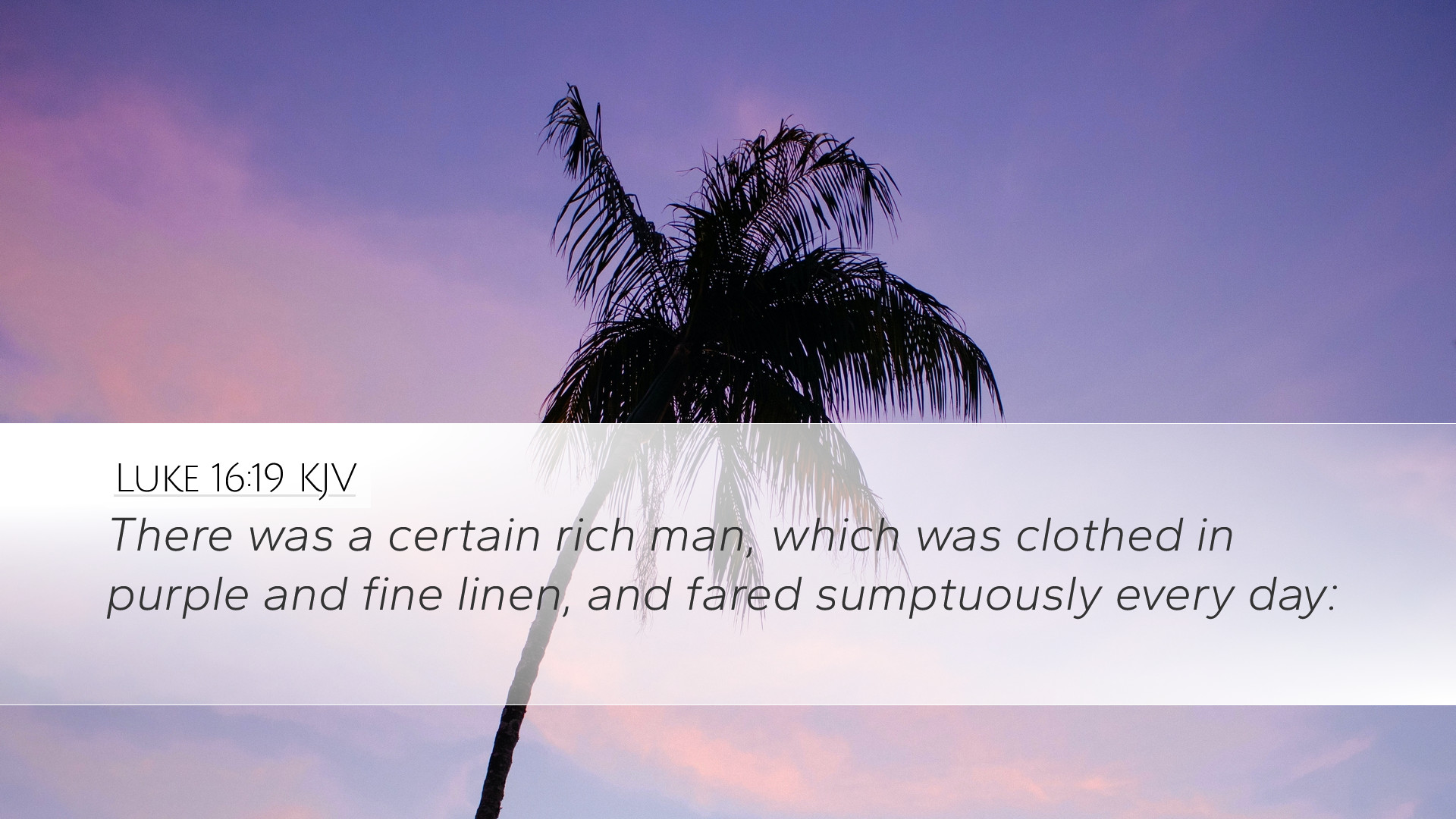Commentary on Luke 16:19
Verse Context: Luke 16:19 introduces the parable of the rich man and Lazarus. This narrative not only serves to illustrate concepts such as wealth, poverty, and the afterlife, but it also offers profound moral and theological insights pertinent to the Christian faith.
Summary of the Verse
The rich man is depicted as living in luxury, adorned in fine garments and enjoying the pleasures of life, while Lazarus, a poor beggar, lay at his gate, longing for scraps from his table. This juxtaposition sets the stage for exploring themes of justice, mercy, and the eternal consequences of one's earthly choices.
Insights from Public Domain Commentaries
1. Matthew Henry's Commentary
Matthew Henry emphasizes the stark contrast between the lives of the rich man and Lazarus. He notes that the rich man was not condemned for his wealth per se, but for his indifference to Lazarus’s plight. This serves as a reminder that wealth can lead to spiritual blindness and moral negligence.
- Indifference and Responsibility: Henry points out that the rich man had a responsibility towards those in need. His failure to act is indicative of a heart disconnected from God's command to love one’s neighbor.
- Temporal vs. Eternal Perspective: The narrative encourages readers to consider the fleeting nature of earthly riches compared to eternal realities. Wealth can distract from the need for compassion and spiritual vigilance.
2. Albert Barnes' Notes on the Bible
Albert Barnes focuses on the implications of the rich man's lifestyle and the condition of Lazarus. He highlights how the parable serves as a critique of societal values that prioritize wealth and status over compassion and charity.
- Symbolism of Names: The name 'Lazarus' carries significant meaning. It derives from the Hebrew ‘Eliezer’, meaning 'God is my help', which suggests divine favor despite earthly suffering.
- Justice of God: Barnes remarks on the fate of the rich man and Lazarus in the afterlife. The reversal of fortunes underscores the justice of God in retribution for earthly injustices.
3. Adam Clarke's Commentary
Adam Clarke offers a detailed analysis of the parable, linking it to broader themes within the Gospels regarding wealth and spiritual poverty. Clarke emphasizes how the realities of the afterlife are punctuated by the rich man's torment and Lazarus's comfort.
- Torment of the Rich Man: Clarke notes that the rich man's torment in the afterlife serves to illustrate the consequences of a life lived solely for self-indulgence. His plea for mercy shows a lack of understanding of the finality of his choices.
- Divine Comfort for the Afflicted: Lazarus’s comfort in heaven signifies God’s promise to bless those who suffer and remain faithful. Clarke asserts that this is a deep encouragement for believers facing trials in their earthly lives.
Theological Implications
This verse and its surrounding narrative challenge believers to reflect on their attitudes towards wealth and poverty. The teachings of Jesus in this parable provide a lens through which we can view our social responsibilities and the transformative power of compassion.
1. Understanding Wealth
Wealth is often seen as a blessing in contemporary society, yet the narrative hints at an inherent danger: the temptation to prioritize material accumulation over moral obligation. Pastors and theologians are reminded of the call to steward resources for the benefit of the less fortunate.
2. Compassion and Action
This passage impels Christians to act in compassion towards those who are marginalized. The rich man's inactivity represents a failure to embody the love of Christ, which mandates not only feeling compassion but also taking action. This is vital in the church's mission and community outreach.
3. Eschatological Awareness
The ultimate fate of both the rich man and Lazarus serves as a theological reminder of the afterlife. It emphasizes the idea that earthly conditions do not determine one's eternal state. This encourages believers to live in a manner that reflects the values of the Kingdom of God.
Conclusion
Luke 16:19 is a powerful admonition against the apathy that wealth can foster. It calls for a radical response of love and action, emphasizing that true riches are found in compassion and service to others. Pastors, students, theologians, and scholars are encouraged to delve deeper into this parable to extract its profound messages on justice, mercy, and the eternal implications of our life choices.


